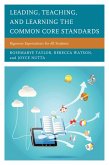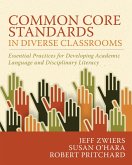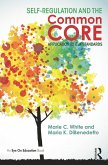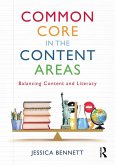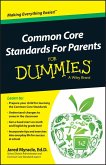Rosemarye T. Taylor, Rebecca Watson, Joyce Nutta
Leading, Teaching, and Learning the Common Core Standards (eBook, ePUB)
Rigorous Expectations for All Students
20,95 €
inkl. MwSt.
Sofort per Download lieferbar

10 °P sammeln
Rosemarye T. Taylor, Rebecca Watson, Joyce Nutta
Leading, Teaching, and Learning the Common Core Standards (eBook, ePUB)
Rigorous Expectations for All Students
- Format: ePub
- Merkliste
- Auf die Merkliste
- Bewerten Bewerten
- Teilen
- Produkt teilen
- Produkterinnerung
- Produkterinnerung

Bitte loggen Sie sich zunächst in Ihr Kundenkonto ein oder registrieren Sie sich bei
bücher.de, um das eBook-Abo tolino select nutzen zu können.
Hier können Sie sich einloggen
Hier können Sie sich einloggen
Sie sind bereits eingeloggt. Klicken Sie auf 2. tolino select Abo, um fortzufahren.

Bitte loggen Sie sich zunächst in Ihr Kundenkonto ein oder registrieren Sie sich bei bücher.de, um das eBook-Abo tolino select nutzen zu können.
Leading, Teaching, and Learning is a resource for teachers taking action on Common Core State Standards to enhance student learning. Each chapter addresses various disciplines and grade levels with concrete examples. Chapters focus on research-based instruction, academic language development, thinking and complexity, English learners, non-proficient readers, rigor, and collaboration for ongoing professional capacity building.
- Geräte: eReader
- mit Kopierschutz
- eBook Hilfe
- Größe: 0.84MB
Andere Kunden interessierten sich auch für
![Leading, Teaching, and Learning the Common Core Standards (eBook, PDF) Leading, Teaching, and Learning the Common Core Standards (eBook, PDF)]() Rosemarye T. TaylorLeading, Teaching, and Learning the Common Core Standards (eBook, PDF)20,95 €
Rosemarye T. TaylorLeading, Teaching, and Learning the Common Core Standards (eBook, PDF)20,95 €![Rigor Made Easy (eBook, ePUB) Rigor Made Easy (eBook, ePUB)]() Barbara R. BlackburnRigor Made Easy (eBook, ePUB)22,95 €
Barbara R. BlackburnRigor Made Easy (eBook, ePUB)22,95 €![Common Core Standards in Diverse Classrooms (eBook, ePUB) Common Core Standards in Diverse Classrooms (eBook, ePUB)]() Jeff ZwiersCommon Core Standards in Diverse Classrooms (eBook, ePUB)31,95 €
Jeff ZwiersCommon Core Standards in Diverse Classrooms (eBook, ePUB)31,95 €![Self-Regulation and the Common Core (eBook, ePUB) Self-Regulation and the Common Core (eBook, ePUB)]() Marie C. WhiteSelf-Regulation and the Common Core (eBook, ePUB)30,95 €
Marie C. WhiteSelf-Regulation and the Common Core (eBook, ePUB)30,95 €![Common Core in the Content Areas (eBook, ePUB) Common Core in the Content Areas (eBook, ePUB)]() Jessica BennettCommon Core in the Content Areas (eBook, ePUB)25,95 €
Jessica BennettCommon Core in the Content Areas (eBook, ePUB)25,95 €![Common Core Standards For Parents For Dummies (eBook, ePUB) Common Core Standards For Parents For Dummies (eBook, ePUB)]() Jared MyracleCommon Core Standards For Parents For Dummies (eBook, ePUB)6,99 €
Jared MyracleCommon Core Standards For Parents For Dummies (eBook, ePUB)6,99 €![Brainstorming Common Core (eBook, ePUB) Brainstorming Common Core (eBook, ePUB)]() Eldon "Cap" LeeBrainstorming Common Core (eBook, ePUB)31,95 €
Eldon "Cap" LeeBrainstorming Common Core (eBook, ePUB)31,95 €-
-
-
Leading, Teaching, and Learning is a resource for teachers taking action on Common Core State Standards to enhance student learning. Each chapter addresses various disciplines and grade levels with concrete examples. Chapters focus on research-based instruction, academic language development, thinking and complexity, English learners, non-proficient readers, rigor, and collaboration for ongoing professional capacity building.
Produktdetails
- Produktdetails
- Verlag: Bloomsbury eBooks US
- Seitenzahl: 130
- Erscheinungstermin: 9. Juli 2014
- Englisch
- ISBN-13: 9781475810295
- Artikelnr.: 44909254
- Verlag: Bloomsbury eBooks US
- Seitenzahl: 130
- Erscheinungstermin: 9. Juli 2014
- Englisch
- ISBN-13: 9781475810295
- Artikelnr.: 44909254
- Herstellerkennzeichnung Die Herstellerinformationen sind derzeit nicht verfügbar.
Rosemarye Taylor is professor of educational Leadership at the University of Central Florida in Orlando, and has published six books and numerous articles on improving school leadership.
List of Figures
Preface
Acknowledgments
Chapter 1 Introduction
Development of Common Core State Standards
Assessing Proficiency
Embrace CCSS for Students' Success
Organization of Leading, Teaching, Learning CCSS
Practical Steps for Leaders
Practical Steps for Teachers
Useful Academic Language
Chapter 2 Effective Research Based Instruction
Scaffold Instruction
Lesson Introduction
Guided Practice
Independent Practice
Assessment
Sample Science Instructional Plan
Engagement
Teacher Led Small Group Instruction
Checking for Understanding
Feedback to Improve Learning
Practical Steps for Leaders
Practical Steps for Teachers
Useful Academic Language
Chapter 3 Academic Language
General Academic Language
Discipline Specific Academic Language
Research Based Vocabulary Instruction
Vocabulary Instruction Protocol
Instructional Strategies
Expected Language Acquisition Outcomes
Practical Steps for Leaders
Practical Steps for Teachers
Useful Academic Language
Chapter 4 Rigor-Levels of Thinking, Cognitive Complexity, and
Text Complexity
Making Sense of Levels of Thinking and Cognitive Complexity
Levels of Thinking
Cognitive Complexity: Depth of Knowledge (DOK)
Text Complexity
Misconceptions
Effective Use of Text Complexity
Close Reading
Motivating Students
Student Academic Goals
Writing is Thinking
Practical Steps for Leaders
Practical Steps for Teachers
Useful Academic Language
Chapter 5 English Learners and CCSS
Something More
Levels of English Proficiency
WIDA Language Proficiency Levels
Beginning English Learners
Beyond Beginning English Learners
Support for Intermediate and Advanced English Learners
Cultural Considerations
Learning Scales and English Learners
Practical Steps for Leaders
Practical Steps for Teachers
Useful Academic Language
Chapter 6 Under-resourced Students
School Factors that Leaders Control
Rewards and Sanctions
Academic Resources
Classroom Factors that Teachers Control
Collaboration
Project Based Learning
Research
Resilience
Responsibilities of Teachers and Leaders
Practical Steps for Leaders
Practical Steps for Teachers
Useful Academic Language
Chapter 7 Clear Goals for Student Self-monitoring and Teacher
Feedback
Clear Goals, Self Monitoring, and Feedback
Benchmark Scales with Evidence
Student Friendly Scales
Implementation of Student Self Monitoring and Teacher's Feedback
Instructional Differentiation
Exceptional Student Education
English Learners
Making Learning Accessible
Practical Steps for Leaders
Practical Steps for Teachers
Useful Academic Language
Chapter 8 - Collaboration to Empower Teachers for Success on CCSS
Characteristics of Collaboration
Collaboration is Voluntary
Parity Among Participants
Mutual Goals
Responsibility
Sharing Resources
Shared Accountability
Improving Student Learning Outcomes
Collaboration on Mini-assessments and Data Analysis
Professional Learning for Transfer to Practice
Book Studies
Action Research
Data Study
Massive Open Online Courses (MOOCs)
Lesson Study Research Teams
Leadership for Effective Collaboration
Leading, Teaching, and Coaching to Improve Student Learning Outcomes
Practical Steps for Leaders
Practical Steps for Teachers
Useful Academic Language
Additional Resources
References
Author Information
Index
Preface
Acknowledgments
Chapter 1 Introduction
Development of Common Core State Standards
Assessing Proficiency
Embrace CCSS for Students' Success
Organization of Leading, Teaching, Learning CCSS
Practical Steps for Leaders
Practical Steps for Teachers
Useful Academic Language
Chapter 2 Effective Research Based Instruction
Scaffold Instruction
Lesson Introduction
Guided Practice
Independent Practice
Assessment
Sample Science Instructional Plan
Engagement
Teacher Led Small Group Instruction
Checking for Understanding
Feedback to Improve Learning
Practical Steps for Leaders
Practical Steps for Teachers
Useful Academic Language
Chapter 3 Academic Language
General Academic Language
Discipline Specific Academic Language
Research Based Vocabulary Instruction
Vocabulary Instruction Protocol
Instructional Strategies
Expected Language Acquisition Outcomes
Practical Steps for Leaders
Practical Steps for Teachers
Useful Academic Language
Chapter 4 Rigor-Levels of Thinking, Cognitive Complexity, and
Text Complexity
Making Sense of Levels of Thinking and Cognitive Complexity
Levels of Thinking
Cognitive Complexity: Depth of Knowledge (DOK)
Text Complexity
Misconceptions
Effective Use of Text Complexity
Close Reading
Motivating Students
Student Academic Goals
Writing is Thinking
Practical Steps for Leaders
Practical Steps for Teachers
Useful Academic Language
Chapter 5 English Learners and CCSS
Something More
Levels of English Proficiency
WIDA Language Proficiency Levels
Beginning English Learners
Beyond Beginning English Learners
Support for Intermediate and Advanced English Learners
Cultural Considerations
Learning Scales and English Learners
Practical Steps for Leaders
Practical Steps for Teachers
Useful Academic Language
Chapter 6 Under-resourced Students
School Factors that Leaders Control
Rewards and Sanctions
Academic Resources
Classroom Factors that Teachers Control
Collaboration
Project Based Learning
Research
Resilience
Responsibilities of Teachers and Leaders
Practical Steps for Leaders
Practical Steps for Teachers
Useful Academic Language
Chapter 7 Clear Goals for Student Self-monitoring and Teacher
Feedback
Clear Goals, Self Monitoring, and Feedback
Benchmark Scales with Evidence
Student Friendly Scales
Implementation of Student Self Monitoring and Teacher's Feedback
Instructional Differentiation
Exceptional Student Education
English Learners
Making Learning Accessible
Practical Steps for Leaders
Practical Steps for Teachers
Useful Academic Language
Chapter 8 - Collaboration to Empower Teachers for Success on CCSS
Characteristics of Collaboration
Collaboration is Voluntary
Parity Among Participants
Mutual Goals
Responsibility
Sharing Resources
Shared Accountability
Improving Student Learning Outcomes
Collaboration on Mini-assessments and Data Analysis
Professional Learning for Transfer to Practice
Book Studies
Action Research
Data Study
Massive Open Online Courses (MOOCs)
Lesson Study Research Teams
Leadership for Effective Collaboration
Leading, Teaching, and Coaching to Improve Student Learning Outcomes
Practical Steps for Leaders
Practical Steps for Teachers
Useful Academic Language
Additional Resources
References
Author Information
Index
List of Figures
Preface
Acknowledgments
Chapter 1 Introduction
Development of Common Core State Standards
Assessing Proficiency
Embrace CCSS for Students' Success
Organization of Leading, Teaching, Learning CCSS
Practical Steps for Leaders
Practical Steps for Teachers
Useful Academic Language
Chapter 2 Effective Research Based Instruction
Scaffold Instruction
Lesson Introduction
Guided Practice
Independent Practice
Assessment
Sample Science Instructional Plan
Engagement
Teacher Led Small Group Instruction
Checking for Understanding
Feedback to Improve Learning
Practical Steps for Leaders
Practical Steps for Teachers
Useful Academic Language
Chapter 3 Academic Language
General Academic Language
Discipline Specific Academic Language
Research Based Vocabulary Instruction
Vocabulary Instruction Protocol
Instructional Strategies
Expected Language Acquisition Outcomes
Practical Steps for Leaders
Practical Steps for Teachers
Useful Academic Language
Chapter 4 Rigor-Levels of Thinking, Cognitive Complexity, and
Text Complexity
Making Sense of Levels of Thinking and Cognitive Complexity
Levels of Thinking
Cognitive Complexity: Depth of Knowledge (DOK)
Text Complexity
Misconceptions
Effective Use of Text Complexity
Close Reading
Motivating Students
Student Academic Goals
Writing is Thinking
Practical Steps for Leaders
Practical Steps for Teachers
Useful Academic Language
Chapter 5 English Learners and CCSS
Something More
Levels of English Proficiency
WIDA Language Proficiency Levels
Beginning English Learners
Beyond Beginning English Learners
Support for Intermediate and Advanced English Learners
Cultural Considerations
Learning Scales and English Learners
Practical Steps for Leaders
Practical Steps for Teachers
Useful Academic Language
Chapter 6 Under-resourced Students
School Factors that Leaders Control
Rewards and Sanctions
Academic Resources
Classroom Factors that Teachers Control
Collaboration
Project Based Learning
Research
Resilience
Responsibilities of Teachers and Leaders
Practical Steps for Leaders
Practical Steps for Teachers
Useful Academic Language
Chapter 7 Clear Goals for Student Self-monitoring and Teacher
Feedback
Clear Goals, Self Monitoring, and Feedback
Benchmark Scales with Evidence
Student Friendly Scales
Implementation of Student Self Monitoring and Teacher's Feedback
Instructional Differentiation
Exceptional Student Education
English Learners
Making Learning Accessible
Practical Steps for Leaders
Practical Steps for Teachers
Useful Academic Language
Chapter 8 - Collaboration to Empower Teachers for Success on CCSS
Characteristics of Collaboration
Collaboration is Voluntary
Parity Among Participants
Mutual Goals
Responsibility
Sharing Resources
Shared Accountability
Improving Student Learning Outcomes
Collaboration on Mini-assessments and Data Analysis
Professional Learning for Transfer to Practice
Book Studies
Action Research
Data Study
Massive Open Online Courses (MOOCs)
Lesson Study Research Teams
Leadership for Effective Collaboration
Leading, Teaching, and Coaching to Improve Student Learning Outcomes
Practical Steps for Leaders
Practical Steps for Teachers
Useful Academic Language
Additional Resources
References
Author Information
Index
Preface
Acknowledgments
Chapter 1 Introduction
Development of Common Core State Standards
Assessing Proficiency
Embrace CCSS for Students' Success
Organization of Leading, Teaching, Learning CCSS
Practical Steps for Leaders
Practical Steps for Teachers
Useful Academic Language
Chapter 2 Effective Research Based Instruction
Scaffold Instruction
Lesson Introduction
Guided Practice
Independent Practice
Assessment
Sample Science Instructional Plan
Engagement
Teacher Led Small Group Instruction
Checking for Understanding
Feedback to Improve Learning
Practical Steps for Leaders
Practical Steps for Teachers
Useful Academic Language
Chapter 3 Academic Language
General Academic Language
Discipline Specific Academic Language
Research Based Vocabulary Instruction
Vocabulary Instruction Protocol
Instructional Strategies
Expected Language Acquisition Outcomes
Practical Steps for Leaders
Practical Steps for Teachers
Useful Academic Language
Chapter 4 Rigor-Levels of Thinking, Cognitive Complexity, and
Text Complexity
Making Sense of Levels of Thinking and Cognitive Complexity
Levels of Thinking
Cognitive Complexity: Depth of Knowledge (DOK)
Text Complexity
Misconceptions
Effective Use of Text Complexity
Close Reading
Motivating Students
Student Academic Goals
Writing is Thinking
Practical Steps for Leaders
Practical Steps for Teachers
Useful Academic Language
Chapter 5 English Learners and CCSS
Something More
Levels of English Proficiency
WIDA Language Proficiency Levels
Beginning English Learners
Beyond Beginning English Learners
Support for Intermediate and Advanced English Learners
Cultural Considerations
Learning Scales and English Learners
Practical Steps for Leaders
Practical Steps for Teachers
Useful Academic Language
Chapter 6 Under-resourced Students
School Factors that Leaders Control
Rewards and Sanctions
Academic Resources
Classroom Factors that Teachers Control
Collaboration
Project Based Learning
Research
Resilience
Responsibilities of Teachers and Leaders
Practical Steps for Leaders
Practical Steps for Teachers
Useful Academic Language
Chapter 7 Clear Goals for Student Self-monitoring and Teacher
Feedback
Clear Goals, Self Monitoring, and Feedback
Benchmark Scales with Evidence
Student Friendly Scales
Implementation of Student Self Monitoring and Teacher's Feedback
Instructional Differentiation
Exceptional Student Education
English Learners
Making Learning Accessible
Practical Steps for Leaders
Practical Steps for Teachers
Useful Academic Language
Chapter 8 - Collaboration to Empower Teachers for Success on CCSS
Characteristics of Collaboration
Collaboration is Voluntary
Parity Among Participants
Mutual Goals
Responsibility
Sharing Resources
Shared Accountability
Improving Student Learning Outcomes
Collaboration on Mini-assessments and Data Analysis
Professional Learning for Transfer to Practice
Book Studies
Action Research
Data Study
Massive Open Online Courses (MOOCs)
Lesson Study Research Teams
Leadership for Effective Collaboration
Leading, Teaching, and Coaching to Improve Student Learning Outcomes
Practical Steps for Leaders
Practical Steps for Teachers
Useful Academic Language
Additional Resources
References
Author Information
Index

